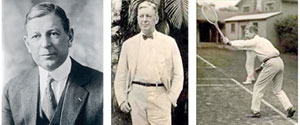Captaincy in Tennis is a confusing concept
View(s):Tennis is considered a fierce individual sport. Being so, any dictation from a second person seated on the sideline during a match, changes this status of the player. Especially, the players’ independence. In this light, ‘Captaincy’ is a confusing idea to be woven into Tennis. However, Tennis, as a ‘team sport’, evolved having a Captain for the last 100 years. I have witnessed the presence of a Captain on court-side, making the player perform well, as well as seen severe conflicts.

Dwight Davis, in three different poses, is the initiator of the now famous Davis Cup
In the pursuit of making Tennis ‘also’ a team sport, by which nations could field teams, American player, later turned Diplomat, Dwight Davis started a team event between USA and England in 1900. This is the inter-nation Davis-Cup for Men. Originally, apart from having an official and ceremonial status at the functions, and refreshing the player in the changeover, Captains were not allowed to get involved in a match, to the extent one sees them today. As it stands, Captains of Tennis teams have a role in the making and conducting the team through the tie to win. The most demanding one of all these is their responsibility to ‘win’ at all cost.
Mahesh Boopathy
Mahesh Boopathy of India took over the Captaincy of the Indian Davis Cup team recently, and won the tie against Uzbekistan in Bangalore. This is Bhoopathi’s first. He is one of the best known Indian players in the last 20 years. His stellar record in ATP Singles and Doubles with fellow Indian Leander Paes is undisputed. In this Captaincy, he got a squad selected by the committee. Being responsible to win, he must have had a strong say in the selection process. Off the squad, the team that ‘played’ was entirely his choice. He was a Singles and Doubles player for India in numerous Davis Cup and national team ties. He must have had good and bad Captains. This experience showed his competency during the tie. The Captain’s work is a long term one. What we see mostly are Captains with players on court-side only. This is the final act, not the whole drama.
 With winning mandatory, the team Captain’s position today, in general is that, he could be axed for losses and praised for the wins. This mixed baggage is more than a joy ride. Sometime ago, players were not involved in the ATP and WTA round the year professional circuit. As a result, they could be camped and made physically and mentally fit for competition using coaches and physical trainers. This is no more possible. Pro-circuit is bread and butter for players and they cannot be pulled out of it. Then, how are the national teams managing now. Not too well. In a way, once famous and prestigious Davis Cup and Fed Cup has lost its lustre, as nations are unable to lure their best players into their teams.
With winning mandatory, the team Captain’s position today, in general is that, he could be axed for losses and praised for the wins. This mixed baggage is more than a joy ride. Sometime ago, players were not involved in the ATP and WTA round the year professional circuit. As a result, they could be camped and made physically and mentally fit for competition using coaches and physical trainers. This is no more possible. Pro-circuit is bread and butter for players and they cannot be pulled out of it. Then, how are the national teams managing now. Not too well. In a way, once famous and prestigious Davis Cup and Fed Cup has lost its lustre, as nations are unable to lure their best players into their teams.
New approach
To overcome this, big nations with financial muscle send their team Captains also on tour. If not to all, at least to the big events, to evaluate and assist players. It has its advantages, if the ‘Captain’ is a experienced player. Their observations can make players better. If this is not the case, players on court could feel awkward, knowing they are being watched by an incompetent Captain who can change their career prospects.
The Stakes
For the Captain’s, winning the Davis Cup, Fed Cup or any other team event is the final aim. Going by statistics, very few countries have won the Davis Cup. The ITF, the owner of the Davis Cup, to stimulate the nations, has created intermediate goals to nations, and worked out a not-so-easy-to-understand ranking system on a 4-year aggregate basis. In this table, Last year’s winner of the Davis Cup, Argentina is No.1 with 26,920 points, India is 18th with 2,118 points and Sri Lanka 78th with 32 points. We consider any improvement to the 78th position as success.
In nations, where there is not much emphasis in player development, the work of Captains, Coaches and Managers are ornamental, than effective tools to enhance Tennis. Player development largely depends on a nations network of playing facilities, effective match playing possibilities and encouragement players get on a day-to-day basis for years. In short, players are only good as their nations ‘Tennis network and playing base’.
Who wins the Tie
There is no hard and fast rule, nor a good prescription, to be a good Captain. Being a position of status, a reputed player’s stand would carry a lot of weight. Regardless how well reputed and good the Captain is, it is the players responsibility to win matches and hence, the Tie. There was a time when players’ playing positions could be manipulated by the Captain, to win. With world rankings firmly established by the professional bodies, all those manipulations are not available anymore.
There is a well known saying that “you are only as good as the people around you”. This is most true with regard to Captaincy in Tennis. Any Captain will pray for a team of good players and the players will pray for an experienced player as their Captain.
–George Paldano, Former int. player; Accredited Coach of Germany; National, Davis-Cup, Federation Cup captain/coach– geodano@gmail.com


